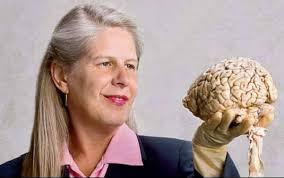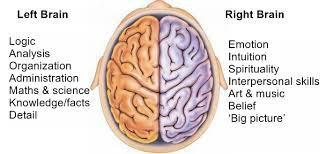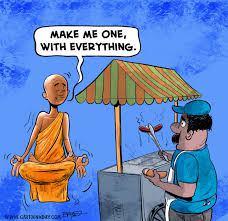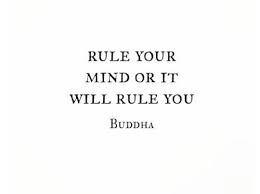It’s said that a key to happiness is gratitude for what you have. I am extremely grateful for my brain. Not that mine is so special; all human brains are. Jill Bolte Taylor’s 2008 book, My Stroke of Insight, is a good reminder of this.

Jill and her brain
Jill, 37, single, awoke one day with a bad pain in her head. She had trouble with normal morning routines. Something was very wrong. A congenital malformation of blood vessels in her brain had suddenly blown, flooding it with blood, which is toxic to neurons. In short, a stroke.
Jill was a neuroanatomist – a brain scientist. She, if anyone, was capable of understanding what was happening. And she knew well that with a stroke, time is of the essence; the faster treatment begins, the better the outcome. Yet her detailed chronicle of that morning is agonizing to read. It took her quite a long while to connect the dots and decide to get help, because the stroke was wreaking havoc with her mental functioning. And that worsened with every passing minute as the hemorrhaging continued.
Still, it seemed puzzling that she didn’t act right away, while she still had most of her wits. I was reminded of Paul Kalanithi’s book, When Breath Becomes Air. He was a neurosurgeon who got cancer; he too delayed getting help, rationalizing his severe symptoms as just due to the stresses of his intensive medical training. But he should have known better. When he finally got himself checked out, it was too late. He was 37 too, when he died.

The doctor figured out who was calling. “Go to Mount Auburn Hospital,” she said. That was all. I was appalled. Jill couldn’t even talk.
Eventually, she also managed to dial her office. A colleague, alarmed, went to her apartment, and got her to a hospital, probably saving her life.
But here is a fascinating point. One reason for Jill’s delay is that she was loving what she was experiencing.

The stroke ravaged Jill’s left hemisphere – so, she says, it “no longer inhibited my right hemisphere, and my perception was free to shift such that my consciousness could embody the tranquility of my right mind. Swathed in an enfolding sense of liberation and transformation, the essence of my consciousness shifted into a state that felt amazingly” like what Buddhists call nirvana. “I was completely entranced by the feelings of tranquility, safety, blessedness, euphoria, and omniscience.” (My emphasis)

Proprioception is only one element of our sense of self. How the self is created is something we don’t yet truly understand. (For an excellent discussion of that problem, click here.) But as a brain scientist, Jill sheds some light by describing how she lost her self.

She recovered, but it was a tough eight-year slog. Much of her mind had to be rebuilt, reprogrammed – she was like an infant needing to learn the most basic things about life and the world. The hardest, she says, was reading: “I had no recollection that reading was something I had ever done before, and I thought the concept was ridiculous. Reading was such an abstract idea that I couldn’t believe anyone had ever thought of it, much less put forth the effort to figure out how to do it.”

Motivating herself was hard. Nirvana still beckoned. Jill had to constantly consciously decide to exit from the “enticing and wonderful” right hemisphere “la-la land” of “divine bliss,” and engage her recovering analytical left mind. And she says she wondered how much of her “newly found right hemisphere consciousness, set of values, and resultant personality” would have to be sacrificed in order to recover her left-brain skills. In fact, she now recognized aspects of her past personality – egotism, argumentativeness, meanness, and various hang-ups – that she’d rather leave behind.

The key to such control, she says, is to recognize when she’s hooked into a negative thought loop. She lets it run for about 90 seconds, then consciously asks her brain to knock it off. This must be done with intensity, Jill says, and she tries to get her brain onto different, better thoughts. (I believe I myself do a lot of what Jill prescribes; but click here for a counter-story.)
All this is an ultimate argument for free will; and Jill does provide some powerful evidence for it.
I will end with this quote from the book: “our minds are highly sophisticated ‘seek and ye shall find’ instruments.

This is highly relevant to our political lives.
Advertisements